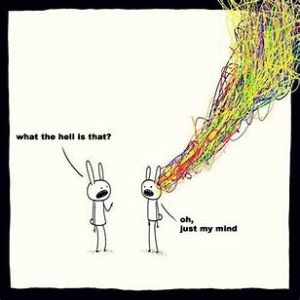Adult Onset ADHD?
Technically, adult onset ADHD isn’t possible, because it’s a neuro developmental disorder, meaning we’re born with it (or at least something interferes with the development of the nervous system early in life).
The DSM requires symptoms to be present before age twelve, but not necessarily fully meeting criteria for diagnosis. Of course, the DSM could be wrong.
The studies supporting adult onset state these adults did not have ADHD in childhood. That means they didn’t have ADHD in the sense of meeting criteria for the diagnosis, but probably they had ADHD brains, they just didn’t show the full basket of symptoms until they reached the challenges of adulthood.
If they were diagnosed with ADHD as adults, using DSM criteria, that means they had several symptoms before age twelve. That’s a criteria required for adult diagnosis.
I had many ADHD symptoms in childhood, primarily behavioral, but breezed through school until I hit the wall in college. Then, oh boy!
ADHD symptoms presumably reflect a delay in the maturation of the brain, a lagging behind normal. ( Possibly this is the cause in only some of us?) This explains why about half of children who meet criteria no longer meet criteria as adults, even though their brains still have not fully matured into “normal” brains and still show the abnormalities characteristic of ADHD.
At this time, if we say someone “has ADHD” we mean they meet DSM V criteria.
doug
Links:
Adult Onset??????DSM V Criteria for ADHD in Adults
DSM V Criteria for ADHD in Children
Questions O the Day:
If someone didn’t meet criteria for ADHD in childhood, and so couldn’t be diagnosed then, but now meets criteria as an adult, which means they had several ADHD symptoms as a child, didn’t they have ADHD brains all along?
They had an ADHD brain but not ADHD?
So did they have ADHD as a child even if they didn’t meet criteria?
So should we say they have “Adult Onset ADHD?”
So do you find this as confusing as I do?
Quotes O the Day:
Me, trying to explain to my wife why her laptop isn’t working properly again:
“It’s technology. That’s the nature of technology.
Or
“It’s part of the innate perversity of inanimate matter.”
Or
“Probably the demons again.”
#ADHD #adultADHD, @dougmkpdp,





Great post! I was the same. In college, I didn’t know how to study because I hadn’t needed it and I eventually dropped out (no regrets, most time). My theory after learning about ADHD is this: Hyperfocus on subjects I loved. But thing in college are more complicated and you’re expected to do more than just sit and listen, so hyperfocus would only get me half the way. Even in high-school I didn’t completely breeze through, to be honest: History and Geography I always hated, because I had to memorize lots of stuff (I excelled in math, science and arts) so I struggled with those until 9th grade (from 10th grade up, I could choose what to learn and I chose science, so no history and geography, yay!)
I have an 8 year old niece (going on 9) in Australia and I’m 100% sure she has ADHD. But she’s doing fine in school and socially, and that sis of mine doesn’t know I have ADHD so I’m butting out until my niece goes to college. My niece had sleep trouble as a baby (ADHD). She’s hypersensitive about what people say to her (ADHD). She can’t deal with frustration (ADHD): she gets very agitated and starts crying her eyes out (which her mom calls tantrums, but they’re not…). For example, once when she was about 5 or 6, she was very excited to skype with me and wanted to show me what her new squiggly drawing wheel made. It started well, then her hand slipped and she screwed up. She went into a fit of rage and tears because it was all wrong. She felt she had been put on the spot: she wanted to show how great she was to someone she looked up to and screwed up. Which is ok, but for our ADHD brains… it’s awful. It became so bad that I stopped skyping with her altogether for a few months. It was too much for her nerves and for mine as well. She’s way better now, but that ADHD brain is still tricking her.
(This reply has been read and edited to 2/3 its original size. Sponsored by lisdexamphetamine!)
LikeLiked by 1 person
so I have a couple of thoughts on this
you know how what causes the flu isn’t as simple as a singly type of virus, but it can be caused by many different types of viruses? I remember reading somewhere that diagnosing and treating influenza is more along the lines of “here are these symptoms, must be the flu”
right? it’s been a long time since I’ve read that so please, please correct me if I’m mistaken
anyway what if ADHD is kind of like that? what if our understanding of the disorder is just surface-level stuff? (I know modern imaging and cognitive tests paint a more “complete” picture but humor me for a second)
isn’t most of our understanding and treatment options of ADHD based on observable behavior and cognition?
what if ADHD isn’t just caused by a different neural topographic or chemical structure? is adhd then just a collection of symptoms or something more?
LikeLiked by 1 person
Hold
good thinking. yes, ADHD has varied causes, causing varied constellations of symptoms from the menu of ADHD symptoms (from DSM V). but it’s more than a collection of symptoms.
flu is a collection of symptoms ( although i think there are now some clinical tests for it and for the type) but connected by its cause by some underlying virus (tho the specific virus may vary). ie it’s not caused by a bacteria, or a toxin, etc. Same for ADHD then, symptoms with underlying related causes – genes, abnormal networks and structures. I don’t know if this makes sense?
thank you always for your comments.
best wishes
doug
LikeLike